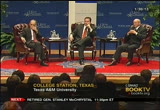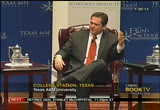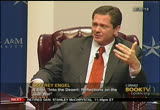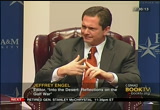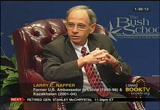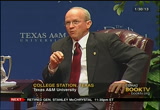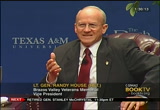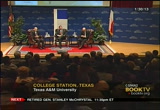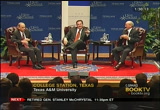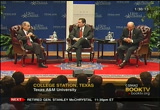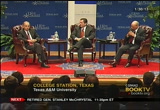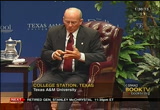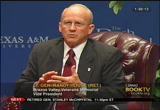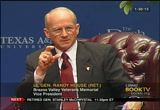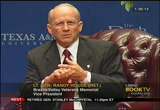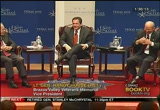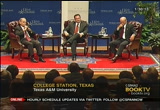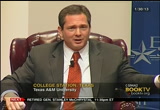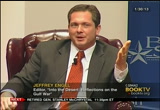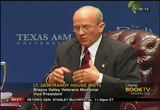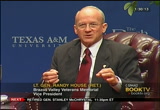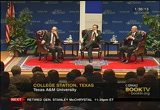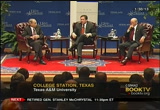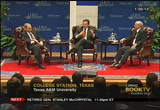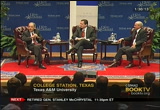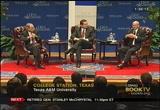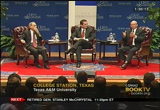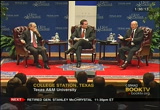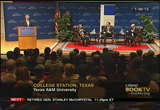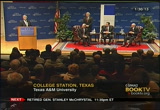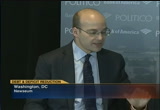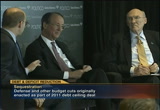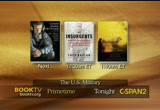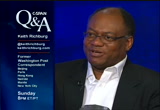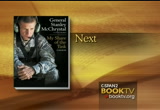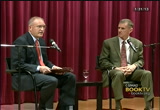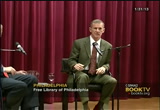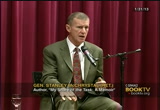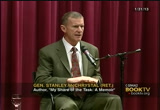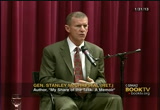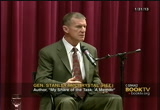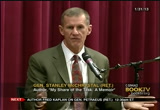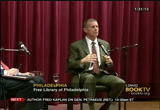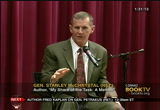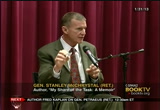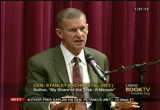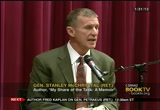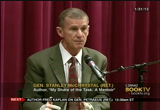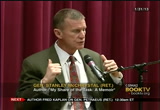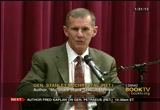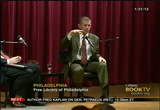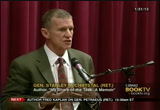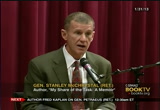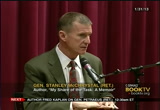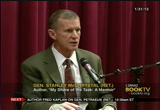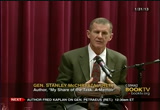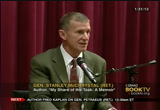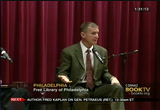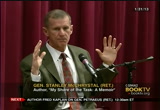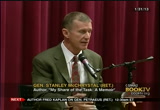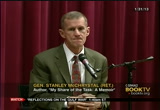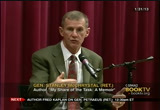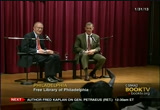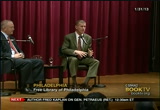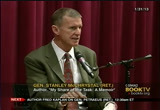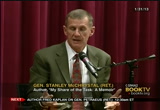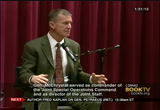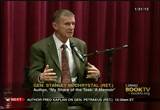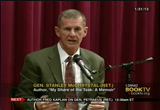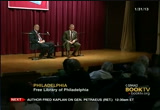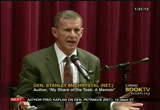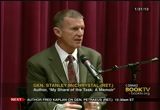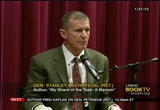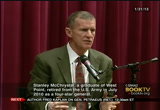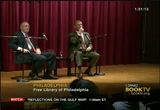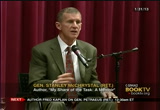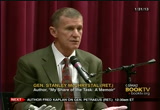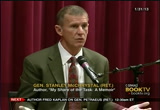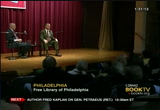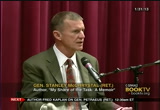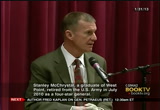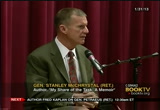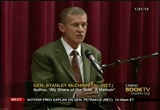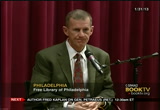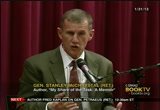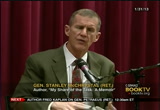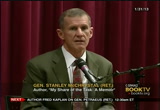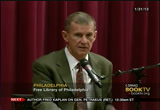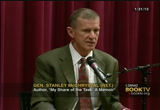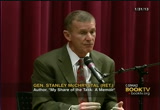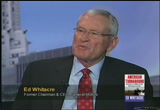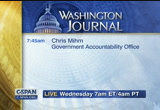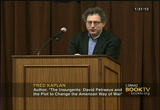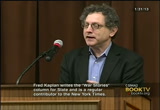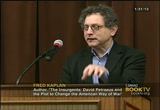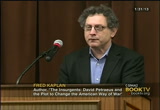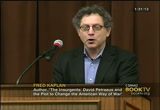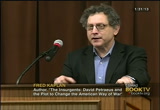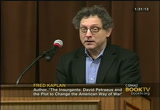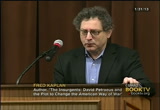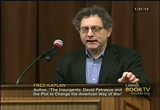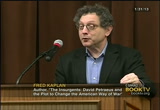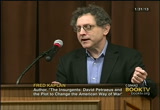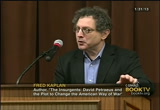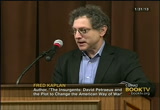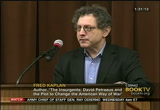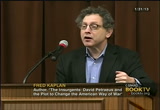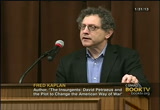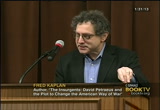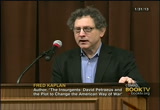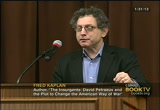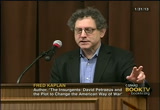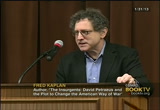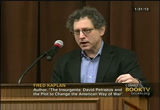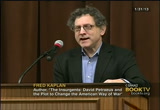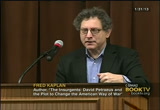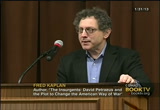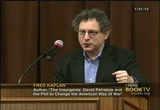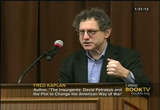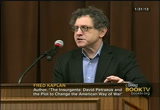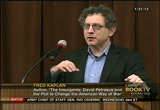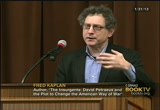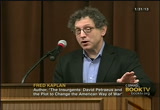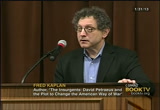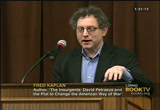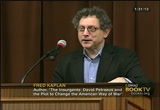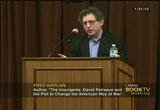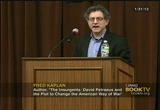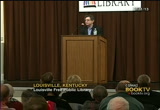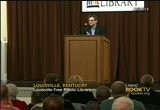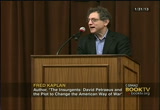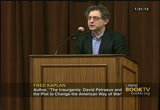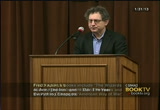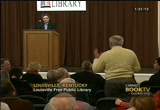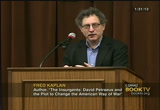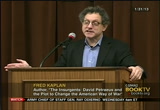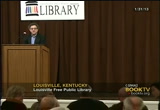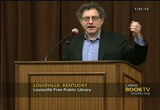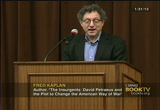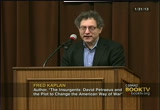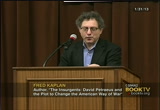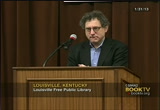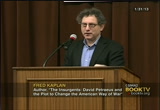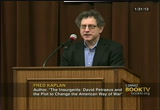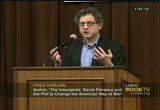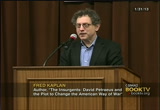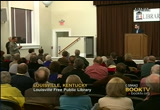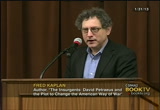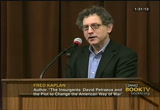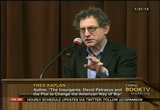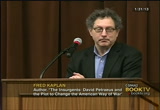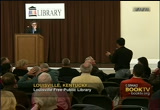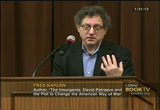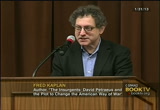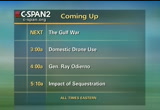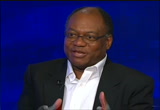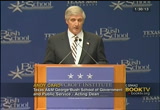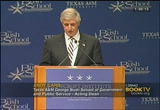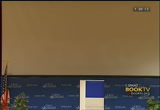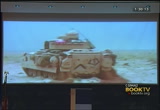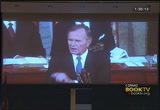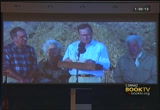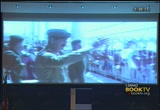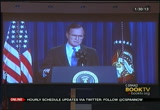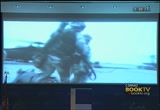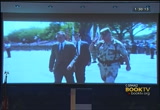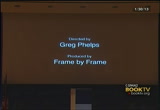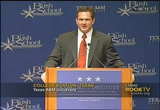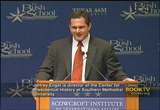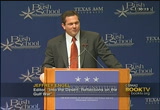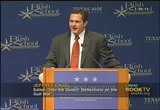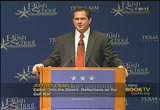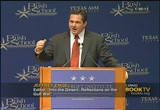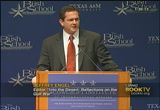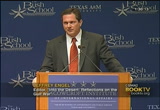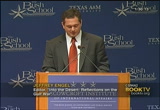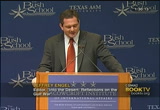tv Capital News Today CSPAN February 19, 2013 11:00pm-2:00am EST
11:00 pm
president bush had this vision of unipolarity coming, we'll have a freer hand in places like the middle east, but we also want to set precedent for how we should uselessness. as see constrained in his object is in to maintain this coalition? did that play out when he looked at the archives? was very definite decision that you could only do so much with so many allies? >> will answer that first since he directed it to me. i'm curious to hear what fellow panelists have to say. bush was constrained in two important ways and also an important thing out of the archive i mind that helps explain his decision-making on in terms to go to war, that kind of work. clearly he was constrained by concerns of the israeli arab dynamic. of course israel is not a member of the coalition, but many
11:01 pm
members, shall we say were not fond of israelis. consequently was constrained and the need to keep the war going on long enough the israelis would want to to retaliate for being had by saddam hussein. at the same time, the desire among many within the middle east for an arab solution must turn if he went further towards baghdad and took over back dad by forests, that this would create greater amity among arab members to be that in some ways as the reestablishment of western colonialism. but there's a very important distinction, a revelation she was in the archives and there's always the questions when the decision comes out about whether or not american forces should continue on to baghdad in 1991. this was not a discussion within the white house for a very
11:02 pm
important reason. the ultimate goal beyond the liberation of kuwait was removal of saddam hussein from power. there was a 100% certainty on high-level officials that this would happen anyway. saddam hussein had embarrassed. his own army was out to get him. if you have two weeks, it would be a shocking seven days. 999 times out of 1000 think that's exactly how things would've played out for saddam would've not survived. unfortunately for the bush administration's perspective, george h.w. bush's dave, saddam rolled the dice and made it, but given the question and i began, they would take the same bed
11:03 pm
again. >> i do think the breadth of the coalition to play a role in that calculation. it is in many ways a strange calculation. my vantage point is from romania were only a few months before in 1989 had been overthrown and the only violent overthrow and eastern europe after the fall of the wall. such esco had been in romania and then a big holiday of saddam hussein and also a variant. and his successors -- many of them came out of the communist party apparatus. they were not the closest associates, but were nonetheless communes. by mr. meanie imports anyway? romania haven't haven't had 11
11:04 pm
of 13 seats on the council. so we really needed, even the support of romania and his successors at a time in the night date didn't like an awful lot of things they were in fact doing. so keep in a coalition that arrived in that deep onboard i think did have some thing to say about constraining object is. >> i was a colonel at the time all this discussion is going on, i was focused on running off guard and tackle. i'd been to there two years before on the joint staff and executive directory joint chiefs of staff and wednesday are for
11:05 pm
general house for six months. the whole thing at the time -- we were this close to the sink commander-in-chief of centcom be an anathema of. it went down. it was between the 23 stars, between schwarzkopf who is being the outset by the army three more admiral and at the time is all about tanker wars and that's all we've been doing, so there is no thought. we had no oil plan, contingencies you can imagine. there is no 1021. 1021 was all about the union.
11:06 pm
the thought of a ground war at this time, even to a colonel was unbelievably remote. >> my question is to ambassador trant divan and general house. and that is, are you buying the kool-aid this man is dishing out? you reminded us at the very beginning of his talk about george herbert walker bush been a prudent, careful, cautious political leader. and then he tells as that he had a vision for a new world oil.
11:07 pm
he was ready to risk an enormous amount because he saw the stakes and is so much bigger than saddam hussein. >> general house? didn't we expect saddam hussein hussein -- but were casualties? can you believe were ready to throw the dice. that ambassador napper misunderstanding the man for whom this library is respected? >> go ahead, sir. [laughter] >> can i interject if i may? >> we should let the kool-aid vendor defend himself. >> i just want to point out if only one of the three of us agrees on this panel, i'm still batting .333 enacted into the hall of fame.
11:08 pm
[laughter] >> i guess i'm at least partly persuaded by the argument. i do think notwithstanding president bush's reputation for person that he also did have a broader vision about the way he wanted the world to look after his administration. and i do think the iraqi use of the crisis for us to accomplish its objectives sort of violated that notion about the post-cold war world might look like. so i do think there are other object is. they were very much concerned about saudi arabia. that was a huge stake is seen to be called into question by the
11:09 pm
invasion. i'm not so sure they would have been so sanguine about saddam hussein controlling the percentage of the worlds oil supply. it might make a difference who controlled that particular spigot. i'm also persuaded by the argument that president bush was concerned that this set of events that completely unraveled and impossible to validate everything he'd invested won't be reconsidered his relationship , but after matzo had come to invest something in this relationship. to once and for all and the cold war. there were many object to seesaw and the diplomacy of the first
11:10 pm
persian gulf war. but i am at least persuaded that part of his calculation was something had to come out of this that would mean a better world in the long run. he had to have a way to answer that news conference question, what comes next. next is an international coalition working together against advice and divisions that would be strong enough, durable enough to turn the direction and a critical juncture. >> sir, the context is that you lose after you know what happened was after we had gotten out of vietnam, we had been
11:11 pm
involved in an island fight that was the notch and then we have been involved in just cause taking down noriega in panama. when i got to the polls with nine per gauge and 90, all we knew we were going to defend saudi arabia. as a matter of fact, we started plans to sell a campsite have in germany. i saw the one time and all this is going on in washington, i never saw a tv or listen to radio. i'm in the desert. no one had been there since jesus christ. there is no cameras, no nothing where we were. no roads, no trials and i could
11:12 pm
see you sitting there like we had in europe forever. so we started playing up plan to build ranges. so you just kind of had to understand the context at my level of where we were. after vietnam, after two tours of vietnam, i lived through 20 years of how bad it was to be a soldier because we've done these terrible things and be at on. the only thing i knew was when we went to the gulf war, we were so good in the reagan dollars m. but it happened to america's military after vietnam, i
11:13 pm
remember being nice after the war by several think tank groups they came in to talk to me, they says, was about fratricide. did you worry about where the enemy was? genome where the the enemy was? i said i didn't care. i like to know what the friendly's for because they knew they could eat any enemy we ran into. the context at the time had so been lots of where we where and what was going on at different levels and never seen any of these briefings. you know, never seen a toter, november we didn't really know we were going to attack iraq until sometime in december. all of our plans for defense says. we were defending saudi arabia
11:14 pm
and weston until sometime in december that we started working for schwarzkopf's level, you know, colin powell's level. you know, they were into offensive were planning, but not at my level. so i don't know if his streak in the or just not quite understanding what was going on. when you are a colonel commentary tradition with his son and the president of the united states nine. i just ran off guard and ran off down. [laughter] >> i'm going to except both of those insipid endorsements. >> spare, your question. >> dr. engel, i want your
11:15 pm
thoughts on the military revolution of affairs. i see little but as the kool-aid and that maybe president bush wanted to maintain order and stability, whereas in tiananmen square, there was no real danger to the outside reaching a few of. so given that, i am skeptical of the revolution in military affairs. so not even a colonel i've been grounded in army.dream such that i see interest capabilities. so the communication capabilities certainly would end this conflict astronomical in the advance and i'm sure general house can speak to that. i was wondering what your thoughts are with respect to the pole for planning for the and from the beginning and whether or not you think this is a revolution in military affairs.
11:16 pm
>> no, actually i don't. for two reasons. the first is we have a lot of memories as i mentioned before, memories are bad, terrible things. if i asked most of you which you have for lunch of it. if i ask you which he signed tv 22 years ago, you remember which he sought over the last 22 years, what not which he sought 22 years ago. along television screens was remarkable images of hitting exactly what we wanted. two points about this important remember. the first is that's quite impressive and something that is clearly the enemy didn't have. the second two points are to buy the pentagon didn't show you any video of things that miss.
11:17 pm
that is bad pr. and the percentage of weapons that were smart weapons in the first gulf war but infinitely more than anything the iraqis had was remarkably small compared to the impression the pentagon gave them a military briefing for the alicia pictures of smart bombs and smart missiles and things fly into windows. that was the percentage actually expended. so i don't think this is a revolution in military affairs so much as a vivid demonstration of just how proficient the united states was in waging war, especially can do this proficient adversary. but it also is a military affairs in a fundamentalist about is the car still has a boat here and the ultimate goal of the conflict was a political goal and therefore the military
11:18 pm
plan made that involve smart and weapons were designed with a traditional military conclusion, which in truth is not revolutionary at all, getting the enemy to do what she wanted. i can't see it as fares. and getting assigned from the back right of time, but i do want to give -- >> yet, let randy comment. >> the revolutionary military affairs was something that, at the time goldwater-nichols had been passed to try to join up by the military and the results of his top about back in the 80s. it is this revolution in
11:19 pm
military affairs and what it meant to me was finally after coming out of the non-we have had real tinkerers in the military as a devoted to to wage war at a higher lethality level, using all the tools in the toolbox. i mean, when someone says fight you have for air force says, because we need them. the marines have been air force, army and air force, navy has been air force. the air force has been air force. but when you're at war planner or fighting commie tiptoes senator toolbox and it was wonderful i thought what we had received from the american
11:20 pm
taxpayers for these unbelievable tools. to start weapons would still be understood and everything. all that was there is a combination of hardware and a combination of training that occurred since the vietnam war, all the things that went in voice headteacher worry about the enemy? i said i just worried about my buddies. i didn't want to shoot my own guys. >> let's take one more question. professor parker. [inaudible] >> bush's policy is governed and the precedent will be set for a post-cold war world.
11:21 pm
one of the earlier threats was the question of wmds. they do show up on the battlefield is at least a possibility. i was in south france at the time beginning to study abroad. they actually had missiles he had failed to. turns out not to be the case. i guess my question is, do these crop up since the war starts and, other things about the bush administration wishes to set precedents. in other words, once they're in the conversation, and this is some 10 minutes looked at as well as a way to set the post-world war was not even through the were enemies? >> that's a very good question. the answer is yes and no. let me give you the note first.
11:22 pm
and quite certain i'd like to hear your thoughts. these concerns, maybe even nuclear concerns are clearly concerns on the battlefield, at the highest level, secretary of state presidential level, george bush did not seem to be too concerned about keeping iraq from using wmds as a way to remind others not to do them with one exception. president bush voter letter to saddam hussein on the eve of the warfare. this is rather unusual. secretary of state baker who met with tariq aziz in geneva. ssml is your terms, if you use nuclear weapons or if there's
11:23 pm
attack against any american ally anywhere in the entire world, we are going to presume you did it the we are going to respond with nuclear weapons. they use phrases such as fully as the fullest measure of our arms. not so much setting a precedent, but telling enemy leader just before the conflict begins but here's the front lines was explicitly done by the bush administration. >> it came in as a surprise to the international community just how far along saddam hussein was in this nuclear program once the inspectors again have access to iraq following the gulf war. so while it may not have been first and foremost in the mind
11:24 pm
of planners before the invasion, is significant fixation of the international community later that he had achieved a march towards nuclear weapons and nobody new much about at the time. >> with dean standing there, having to figure out how to answer this click, as a brigade commander i was convinced we were going to be fine, that they were going to hit us with chemical weapons, but we were so well-trained the only thing we really needed was more water to cope with the chemicals we had with this to cleanse their tanks and personnel carriers and everything put lisa we could get back into the fight. so we ended up getting 5000 japanese water tracks part of the formation and we trained and
11:25 pm
trained on how to decontaminate from chemicals we knew we were going to have. the gulf war lasted 96 hours. i thought for 36 days. i was trying to convince iraqis that the wadi albertine was the gap of the region and in the main coalition attack would, and hook into kuwait. they put the syrians to my right. my right flank with the syrian forces that had the same tanks that saddam had, which was always kind of interesting. so for 30 days and running with dozens of soldiers, trying to elicit a response and clearing the mines in going to fire trenches and try to make it look like the main coalition attack
11:26 pm
would come right up in the society than in 17th and 18th court to the west is where scott didn't want saddam's folks to see that, so they kept running my prepaid up the wadi and every time we read bob three, which is everything on better gas masks. we had rubber booties, suits, gloves and mask out of the carriers ready to put them on because we knew we were going to get fined one of these times. it just never happened. so as diplomatic moves the latter talked about nukes, maybe the interpreter that should be butternut fineness because they had released so anybody over there who are threatening could have retaliated with chemical
11:27 pm
weapons. so there's so many bubbles. this is for all you cadets here, thank you for coming because the levels of interaction just today has just been unbelievable. what the president was thinking about doing all these different levels and i was just out there at the end. just tell me what to do, bias. >> i will jump in as the boss. [laughter] and i say thank you are a match to dr. engel. [applause] i happened to be on the trippi saw highly didn't deal with the president and mrs. bush went to
11:28 pm
saudi arabia to see the troops before the ground war started. the white house staff is trained to use gas masks and put on clothing, so we were concerned about the use of chemicals in very bad things. with that, arafat has some very good things if you would please join us outside, we have refreshment to know the chance to buy the book and have it autographed by the author or the editor and the thank you are coming. we're proud of the bush school of them to be part of the texas a&m university. i'll leave reminding you all think that texas a&m center around x once, integrity, leadership, loyalty, respect and sauces service and are all personified in george w. bush and were fortunate to be the bush school of texas a&m. thank you.
11:30 pm
are you who >> look, there is no business cutting across the board. you try to search for the things that have the least adverse effects on productivity. second, you're cutting those areas where you need to invest in the structure. that is so stupid. >> yet, it sounds like when you think that when the sequester kickstand, that may be a window to do something big. tell us what is going to happen on march 1 when the sequester kickstand, and why do you think that might be a chance to do something? >> when you guys see what
11:31 pm
happens, you guys are going to be upset, and so will everyone else. they will come back and say we are sick of this let's do something smart, let's try to work together and fix this debt. >> the senate this week featured some of booktv's weekend programs. in an hour, fred kaplan on general david atrios and his advisers and how they change u.s. military strategy in his book, the insurgents. then jeffrey engel looking back at the gulf war.
11:32 pm
11:33 pm
they threw aside the vestiges of communism a long time ago. in north korea, it is all about preserving of the military and the dynasty that you have there. it really has nothing to do with what i think karl marx had a division way back. it has to do with a fascinating book on how communism was moved into asia. it is an absolutely fascinating split that occurred. >> keith richburg on 34 years of reporting and insight from around the world. sunday at 8:00 p.m. on c-span's "q&a." >> stanley mcchrystal retired from the army in 2010. the former commander has written a memoir. he talks about his book in the library in philadelphia in january. this is one hour.
11:34 pm
[applause] >> thank you very much. thank you for coming out. i think it is a wonderful opportunity for the gentleman sitting next to me. and it's kind of a great deal. for anyone who is paying attention to american foreign policy and military affairs, you know that ever since the attacks on 9/11, the united states has had to evolve militarily and in our intelligence community to meet the challenge of this new enemy. more than anyone that i can think of, general mcchrystal has been responsible for shaping that evolution and developing what i call the targeting engine, which is what i think we
11:35 pm
have adopted as our primary method of defending the country. thank you for being here, general mcchrystal. it is great to see you. >> i know that you are the commander of our special operations in iraq and afghanistan. and there has been, as i mentioned, a rapid evolution. i am familiar from writing black hawk down with the way things were in the early '90s. can you give us an idea of some of the overall strategies that have evolved, and we will get the specifics and also maybe the tactics that you have developed? >> taking you back a little bit, at the end of the vietnam war as america has done with other boys, special operations units
11:36 pm
that are created, they essentially get gutted or disbanded entirely. there is a bias to do away with them. in the late 1970s, the american special operating forces, they were really in pretty prophetic shape. they were barely a shadow of what they had saranac payday at the vietnam war. in 1980, the mission was launched to try to conduct a rescue mission to rescue the american citizens were held hostage in the embassy. and it failed. it not only failed painfully, but it failed for many reasons. one of which is our special operations capabilities, while he still had people that were brave and strong and whatnot, they were not an integrated community capable of doing very complex things. that was a very complex endeavor. from the ashes of fact, there was a report called hollowly commission, and it recommended that we take a look at our capability to do this kind of
11:37 pm
operation and the structure to do that. i entered special operations a few years later as a young ranger officer. and i was able, and i try to tell this in great detail in the book, when you start to build a special operations capability as we were doing in the early 1980s come the first thing you do is find stereo typical operators. typically guys with big shoulders, arrays and all that sort of thing. you have to have a huge can intelligence capacity, aviation to bring it all together and most important, you must have a culture. the culture has to be very mature.
11:38 pm
it is not a stereotypical rambo kind of thing. and so you have to build a culture that has evolved a problem-solving i went through the first gulf war where we did scud hunting, hunting for iraqi missiles and we were getting and we were getting better at what we did. we went to school on that experience, aided by the document that he had written on an operation that have gone very badly but then had been essentially dealt with by the force on the ground with extraordinary courage. but a lot of polls came out. we came out as a fairly brutal force. an example, if everything went perfectly the way you plan to,
11:39 pm
how do you deal with things when they go badly? you have the resilience to deal with the? we started to fix that and make it a more resilient force. we went out in 2001 after 9/11, of course, the first operations of afghanistan drive out al qaeda and were some brilliant individuals. working against a nationstate. but where we found ourselves in late 2003, which is when i returned to special operations was suddenly things in iraq started to go very ugly in the late summer. if we could just arrest saddam hussein, that could stop the problem. and what we did was, we did so.
11:40 pm
what had grown beneath the surface was a cancer like network led by a guy who had created an al qaeda related organization. it wasn't technically al qaeda at that point, but it was a combination of a foreign leadership and frustrated iraqi sunnis, and they were a network and not a small organization trying to do one or two things, they were trying to run an insurgency in tactics. so suddenly the force that had been beautifully designed and honed to a fine edge, with very precise but episodic occasional operations, he was unprepared and unable to do a wider problem. it's like having a s.w.a.t. team for your police force for all of philadelphia. but in reality, if you can't cover the city and you can do a lot of things, the one s.w.a.t. team can never be decisive. that is where we found ourselves
11:41 pm
the begin with a significant evolution and it began to change dramatically. >> in somalia, the task force ranger had be been there a month or two before the big battle that i wrote about. during that time, they had launched six missions. so the pace was intelligence gathering, finding targets, planning and operations, sometimes very quickly. once that intelligence came together, then launching it. described what a temporal up-tempo means and how that applied in iraq? >> that's exactly right. there were eight series of these that happened a number of days apart. so you gather intel, you get it together, you make a decision. you set yourself criteria to launch when the criteria are there. but it's a pretty centralized, deliberate process. we were originally doing that, and we would have this precise thing. what we found is that we were
11:42 pm
having a very narrow slow effect. we would capture all those things. the force, one of our small forces around the country would do the operation and it might take a day or two for them to send the individual back to headquarters where we could begin effective interrogation. the stuff that was captured with typical ego in a plastic garbage bag. and it would would be written in arabica typically, and it would come back and it would just, it would be 48 hours old before it got to the main headquarters and i would sit there because we didn't have translators to do it. i win in this room, there was a pile of the stuff that had not even been read or would it come as we called it, digest it for intelligence. counterinsurgency or intelligence is all about
11:43 pm
whoever knows the most wins. so we have this incredible inability to digest information, process it, and operate. we started to get where we could be a little bit faster. but we developed a system called f3ea. you find someone, you fix them in a location, you finish by capturing their killing, you exploit whatever you capture come you analyze it and you learn from them. it is a learning cycle in action and we would do that. and we would go through that process. but it would be painfully slow. we were operating with different organizations, not all organic to mind this may surprise you, but not all parts of the u.s. government work together seamlessly. [laughter] so here we are. there is this cycle. we have these things between the
11:44 pm
parts, one element would find a target, but by the time the information out to the people who are going to fix it with a predator or something like that to make sure they are there, time would have passed and accuracy of information would have passed. then it would be passed over again. it's like the game telephone. words unintelligible by about this person, we are trying to do things and we started, we ran on the campaign to fix that process. bringing in different parts of the organization, building our intelligence capacity, giving ourselves a mindset that was different before. before it was as if each element did its part to take great pride and we succeeded and did what we were told. we biked that queenan said nobody is successful unless the whole process works. the definition of winning is the same for all of us, only if we win this fight. that was quite a bit different than what we have had.
11:45 pm
by the summer that things got really bad in late march of 2000, that is when the country basically melted down. and we started operating as hard as we could, it was how fast you can operate. we realize the size of the network and we were going to be able to hit it once a month. by august of 2004, we got up to 18 a month or one every other night. and we thought we were more moving at warp speed. we thought this was the most amazing thing we have ever done. we are the most efficient and effective special operations task force and we were, but we were still losing. we came to the conclusion that we have to speed speed up more. there had been this fixation on just going after the senior leaders of an organization.
11:46 pm
and we came to the conclusion that it wasn't going to work. we started the war with the idea that the whole thing would fall apart, but if you think of any organization, the key person is taken out, doesn't get worse? i was in the pentagon and it got a lot better. you realize that you really have to go after the people who do the work, logistics, communications, information, build car bombs, communicate, you have to take those out. so we came up with a strategy. i used to tell people it is like rocky balboa and apollo creed. we will hit them in the mid section and hit them a lot. from august 2004 when we did 18 raids, we were doing 300 raids a month. that is 10 per night. now, if you stop and say, that the law, that's impressive, that means that every guy is going on
11:47 pm
the force in a braid each night. every pilot is flying one or two of these per night. these are not patrolled. someone is getting shot. extraordinary. in order to do that, you cannot use previous systems. you have to be able to bring in this intelligence on the industrial scale, we would start to exploit the computers, phones, we would take biometric data, it would be pumped back to west virginia from the target is if we ever had that person before. and if we had even had any dealings with it. we would move the documents back and send them back to multiple places in the u.s. and everybody would be analyzing and at the same time. and we would be trying to turn this and learn as quickly as we could.
11:48 pm
and we got to the point where we could hit three target tonight from the initial intelligence. we would find joe smith at 9:00 p.m. at night because we had been looking for him. we would find out what we had been looking at that target. that we might hit theirs at three in the morning. another reason it was important was because terrorist networks appear themselves very quickly. pretty soon i will hear about it. the first thing i do is move my location, i changed all of those things and connections that i have, and you have to be quicker than what they can prepare themselves, and also quicker than they can develop new leaders. and over time we started seeing the relative age of leaders go down and the relative effectiveness go down because of that. so became a strategy of going as
11:49 pm
fast as you can so they can breathe. then over time, had the decisive effect on it, which we actually did, along with another of other factors. >> one of the things that are interesting to me about that is the role that technology plays. honestly we have seen the development of jones and the application of supercomputers, one of the things that you did was moving this into the base there, integrating everything upfront, can you talk about that. the role that technology plays? >> yes, there are several things. one is obviously a predator. it wasn't drawn strikes but drone surveillance. because you put a surveillance that gives you full motion video, anywhere in the force, any guys could watch predators
11:50 pm
and full-time real-time video. the real effect of that is where it used to take 120 people to read a rate a target when only 20 were going inside, you have to give people and if you can do from the air, you may send 20 people. now, the other hundred can hit other targets. so we can hit six target and you know so much more. also, you can put drones over and watch people all the time. we decided to watch someone in this room all the time, pretty soon we would know what you call the pattern of life, where you go, who you hang out with, we know all of those things and whether you work at a bad. so you can build up this knowledge, and suddenly you're very precise. you're not going out and picking up a bunch of people and trying to figure out who is good or bad. destruction a lot.
11:51 pm
another was night vision. we had night vision on all of our forces. all of our helicopters come everyone. what that meant was you could see in the dark. but in fire fights you are dominant. in the fight against the enemy at night, we had this incredible dominance. our ratio was probably 1000 to one. in terms of people getting hit. now, the problem is we don't have that many guys. so every time you lose a person, it's a huge cost. because they are so well trained. but still, you have dominance in willingness to go place and do things that you wouldn't otherwise. the other one is less obvious that is the ability to communicate. video teleconferences and not so much radio, but we did use radios and for example, we would
11:52 pm
take all of our radio is happening on the ground. we would pick them up. we would put them into our classified computer network system. so we had a technology that would allow you to set your laptop wherever you were in afghanistan or iraq or everywhere and you can watch from above what is happening and you could listen at the team level. you say that i could micromanage , well, we didn't, but you could reach down and have this situational awareness, which allows you to know what is going on. if something goes bad, you could move medevac were a lot of things to help out very quickly. >> the other thing that it does is if you are going to be effective, you have to be a better network than they are. think what your network is. it may be the people in your church, where you work, family, it can be a combination of
11:53 pm
things. how you communicate with them determines often the strength of how you share information. you know people for 50 years, we started every day with the 90 minute video teleconference. thousands of people. we have a conversation about updates. updates and operations, all the people, everybody here is a senior leader everyday and nature of the conversations plus information go up and down. so the whole organization knows what we think the situation is, where it is going, what the effective, it decentralizes decision-making. everybody knows what the leadership things, they don't have to come up with the decision. we didn't ask them to come up with decisions. i didn't make tactical
11:54 pm
decisions. i wanted them to do that. i gave them an effect and i said, here's here is what we have to do in this area. you figure out how to do this, the only thing that i do is constant pressure. >> that revolutionized the way we could operate. it was communication at the heart of a. >> one of the things you mention in your book is the emotional impact of this kind of videoconferencing had on intelligence analysts and working with those who are getting briefed by the guys who acted on information that they just provided. what kind of effect did that have? >> we have talked about cultural differences. one of the things that we have talked about special operators if you are brought up to have this tribal culture that is very macho. and it is a little bit intimidating, intentionally so. people are often a little hesitant.
11:55 pm
the operators don't have all the expertise. as we started to grow, we became a meritocracy. the operation had occurred because of what the analysts had done. the operator is saying, great job. all part of the team. another case, you would go into the headquarters, which we pushed operators everywhere and rotated analysts, and i would go when and see a big operator leaning over a table, everything in the command was pilot, and there would be a 22-year-old female analyst to wait like 98 pounds, and she has her finger in his chest saying, when you do this, you have to do this or that, and he has taken it. he wasn't perfect. this took years for us to get
11:56 pm
to. and there were stops and starts and constant stress stresses, but it was key because suddenly everybody on the problem. >> one of the things that you also touched on was the evolution of interrogation, which was a very hot topic. early on there was these enhanced interrogation methods, can you talk about that a little bit? >> yes, how many people here have ever run a prison or an interrogation facility? [laughter] >> at how many we had in my command. and if you think about it, if you go back to 9/11 and the first response is, what do we do? we start capturing this and we bring the special stand. they are literally were not any. so people go back, we go to the history books and manuals and most of the manuals that were written were designed to be
11:57 pm
conventional war between two armies were you capture a certain amount of the soviet army. that is the way they were designed. we are talking about guys that are in a terrorist network. so we had to earn our way through it. the nation had to come to grips. it is still an ongoing discussion. but if you remember after 9/11, people jumping out of the twin towers, holding hands to their death, everybody wants to remember it now as we are sitting in philadelphia, also i will remind you that in baghdad, we were knee-deep in blood literally. it was unbelievable what was happening. the torture chambers we were finding and so forth. against that backdrop of losing comrades, we had to take our interrogation techniques and figured out.
11:58 pm
we originally used enhanced techniques, which really wasn't very dramatic. you could limit to 10 or four hours of sleep per night. you could make them kneel down and i don't agree with that. but that is the limit of what we are at. anything i was ever involved in was not that. but the nation had to come to grips with it. there were a couple of things, first, we learned to deal with that was long kinds of conversation. very respectful, persistent, the individual lead us to this spiritual advisor, and i take this in great details in my book. we had him for weeks, and at one point, we did movie night with him. we had two primary interrogators with them. they developed a close relationship, they finally said that let's take a night off and have a movie.
11:59 pm
they all sat together and had a movie. and it was the exorcist, and that was the joke. but that is the way that we did it. you know, over time what you try to do is convince that person that they want to communicate. they will do for a it for a lot of reasons. sometimes because they are scared of being prosecuted. sometimes because they are boastful. sometimes because they are worried about their family. there are any range of reasons. but at the end of the day, you must convince them they just want to give you information. the problem is multiple levels of torture. the first is the academic argument of whether it works or not, and it's almost irrelevant. what happens is you torture yourself.
12:00 am
the torture crosses a line and becomes something different from what you are raised to be what you believe in. once you do that, i don't think you can come back very easily. the problem is you're dealing with people with oppressive time, and they were killing thousands of iraqis. as well as as well as many of our guys as well. you feel and see your comrades being killed, you see this extraordinary thing and say that i have to stop this and the ends justify the means and i have to stop there. but it doesn't. because you grow the force. the other thing that happens is, those pictures, they were all an aberration, and i think there were. many people, they were proof positive that america does that by policy. and we had thousands of young men come from north africa, syria, saudi arabia, other countries because they had seen
12:01 am
us and they felt that they had to join the jihad for that reason. once they are in their, essentially we had to kill most of them. but they were amped up on a vision of something that met preconceptions. if you let it become a policy be, you mobilize your foe and increase it and you mobilize it. any information that you get, in my view, it is much less valuable than that cost. >> i could ask you a thousand questions, but i think i will share the wealth. this is on television, so we have a speaker and actually amplifiers. wait for them before you ask a the question. i will start with my friend. >> should i stand up? does it matter? okay.
12:02 am
>> the push-up position that would be great. [laughter] >> you have said and written that you feel drones alone is insufficient policy. i'm wondering if you could talk about why you feel that. and also given the weariness in the united states of the afghan conflict, and the ineptness and corruption of the afghan government, we think is the most effective thing that we could do and should do after 2014? >> okay. first, i think that drones are really important. they are extraordinarily good for american defense and let us do things that we could not otherwise do. they need to be part of what we do. that being said, if we issued a
12:03 am
bunch of drones to the philadelphia police department and said go after the drug problem in philadelphia, they would be able to figure out some drug dealers and in fact, they would be right in many cases. but if you think you would solve the drug problem, you probably would not. in some cases, you could make it worse because many people would experience this, even though they knew the person was a drug dealer and they would be offended by the fact that they could do that. suddenly you have a very effective tool that has the violation of sovereignty, a perception, even though it may only kill people that are actually guilty, the perception of everyone wondering way, there are civilians, noncombatants there. very quickly there is the
12:04 am
impression that the united states uses power with a certain arrogance. when that happens, you lose potential support. if i'm correct, and i might be a little bit dated, american popularity is not high. at one point it was below india. that is impossible. the people that were most upset were not people in the reserve region. if they are outraged about the theory of it, it is important because people act on their perceptions. so i think that we need to have that capability and we need to use it. but we need to be really mature about how we think about it. we need to think through the process. because you create negative forces with well-intentioned and positive things. it must be balanced. >> the gentleman in the switcher back your.
12:05 am
>> yes, sir? >> [inaudible question] >> the question is, with this part of the united states and the situation on the ground in afghanistan, what should our policy be? the answer is i can't give a perfect prescription or how many troops ought to be there. but what i do think is we went to afghanistan and people that we shouldn't be there. but we are there. number two, we went for our reasons. we went because of it met our goal to get rid of al qaeda. when we set the country sort of into free play, i think we develop some kind of moral responsibility for helping them set it right.
12:06 am
also, strategically, it is in the best interest to have a stable region. if afghanistan were to be completely unstable, i do think that it would be very tenuous and pakistan. and they have challenges. my view is that what we need to do is be consistent and persistent in the region. the reason people are so nervous is because in 2004, they think that we are going to leave and they have seen us weep before. in 1989, we turn from the region. again, it doesn't matter whether each individual afghans saw that, it has become common accepted truth that we left in 1989 and they are starting to think that we are just going to walk into 2014 and there will be nobody but they can rely upon. they do not have other allies. what they are looking for, in my view, is the idea of long-term strategic partnership. i don't think that is a specific
12:07 am
amount of troops or money. it's the idea that you have an ally somewhere. the theory is they are very far away. i talked to the president karzai one day and i said, what you want in future years. how many u.s. troops do in here. and he said that i'm not really worried about it, i want u.s. business. and i want you to be here making money. so that is interesting. and he said because if you are making money here, you will have an interest in our stability. it will be good for you and for us. they are landlocked, they don't make anything we need, so we won't care, is what they think. pakistan, actually, they have many of the same feelings. people say he won us out of the region, i think they want us in the region and they want us to be consistent and stay there. their fear is that we will come in and pull out again and upend things. >> i am a vietnam veteran. i have been in peace movement
12:08 am
for the last 30 years. i was also in iraq in december of 2004. the question is what i consider the elephant in the room. i see our current military is dealing with the american people who pay their way, dealing in two distinct modes. i see you as a master of one leg in each of those. my question is given the vast amount of secrecy that is necessary for the culture that you are evolving and very brilliantly, does it ever concern you what impact this has
12:09 am
on democracy? and the citizenship that really doesn't know what the heck is going on. it is a very important question to me. and i think it would rest the sort of things that you could talk about. i'm wondering if that concerns you at all. >> if i understand your question right, and in many ways, i would argue that i have been in the peace movement for a long time as well. if i understand it, you're worried about the balance between necessary secrecy and there is a certain amount of necessary secrecy if you have a son or daughter, central information on the whereabouts, they become a very real issue. if we have any desire to collect intelligence in the world from sources, people willing to give
12:10 am
their identities, it is very real. i think it is balanced against the wider point, which is are the american people informed about the policies. i don't know if you have read this book, secrets back in 2005, when it came out, he was the guy who copied the pentagon papers and propagated them out of there. it was a very interesting book. his basic outraged came out of part of the pentagon studies. he came to the conclusion that american policymakers weren't stupid. they had done so many analysis is and they kept coming to the conclusion that what they needed to do was this or that. the politically they weren't willing to do that. they were only willing to follow
12:11 am
policies cynically, knowing that the probability of success was low. so they were taking an expedient route against what policy prescription actually said, if you wanted to succeed, this is what you have to do. i thought a lot about that. it is a very interesting question because you ask yourself at each stage, and i think that we struggle today trying to explain something as complex as afghanistan and not doing it in an organized enough manner. whereas if you go back to world war ii, someone could put up a map and you can show progress across the country. it would be hard to do that for afghanistan and iraq because it's so complex. even when you are there, you are constantly grappling for what the truth is. i could go there and write 15 stories, and they would all
12:12 am
convince you that afghanistan is an utter disaster. they would all be true. i could write 15 stories that i'll convince you that afghanistan is a tremendous amount of progress. but the problem is, what is truth overall? everyone wrestles with that. i didn't see a lot of effort to deceive the american people. i didn't see that. i didn't see people trying to get things wrong. i saw some bad decisions that i disagreed with. people wrestling with things that they felt near-term media pressure, we all kind of get up in the morning and get through the day. then we say, oh, we should've been thinking about next year. and i saw some of that. but i didn't feel a lot of evilness, let's deceive the american people. but i haven't seen an effective process for a truly informed debate on policy issues. like iraq or afghanistan or syria.
12:13 am
a few months ago, everyone was saying that we have to get into serious smile. whether that's right or wrong, i don't think it was very well informed. most of what i heard is that people are dying, so we have to go there. i am not an spears and paris because i have been involved close enough to know that there are many conspiracies that work, and there aren't as many secrets as you think, because most of them get leaked. they do not always get leaked accurately, but that is my experience. >> the gentleman with his hand up. >> general, when i was growing up, the big concern was nuclear weapons, nuclear war, mutual deterrence and all of that sort of thing. that sort of faded away with the solution of the soviet union.
12:14 am
yet we still hear about nuclear capabilities of rogue nations like north korea and iran. and the constant drumbeat of what happens if iran succeeds or the north koreans have a weapon that can reach america. i am curious to know your perspective on where we stand, whether we have adequate defenses and should we be worried about missiles from north korea. should we be worried about all these things that are in the news. >> i would be worried about it. i don't think the destruction is close as it was in the cold war, you had a war that would end civilization as we know it. i think what you have is nuclear
12:15 am
proliferation of not only weapons, but the technology and understanding. at some point it gets to irrational or irresponsible individuals. the whole idea is was based upon the fact that your opponent was someone who had something to lose. the danger is when someone doesn't see that they have anything to lose. what everyone is scared about his erratic leadership, although they have been not bombing anybody. but the concern is that they have been very irresponsible using other circuits in the region. there is the sense that they don't have to destroy the world, but all they have to do is get a few weapons out because of where
12:16 am
they are and what they can do, they can do irreparable damage to a small country like israel or to their field and transpose in saudi arabia, and what it has done is lower the to lower the threshold. they don't have to do as much, but if they did any of that, it would be very painful for the people involved. worse than that is once you get beyond the nationstate, one thing good is you have a geographical place to go after if they act with nuclear weapons and weapons of mass destruction. if you get to a terrorist organization, they don't have one. they have nothing to hold at risk. so suddenly they can use it with complete irresponsibility. again, they won't destroy the world, but they don't have to. i think we should be very worried about it. i think that nuclear and
12:17 am
biological and chemical weapons are a real threat and cyberweapons are coming in that same area. the barrier to entry is pretty low. you don't have to have a lot of stuff to go after somebody's cybersystem. so we need to be more resilient and hardened towards that. >> the gentleman in the suit? >> thank you. you know the great capabilities in electronic warfare and etc. what happened in benghazi? >> i have a very classified briefing and i cannot share that stuff. i can tell you that we really don't know. there was a great ambassador with only seven americans in the
12:18 am
consulate total, local forces were guarding it. what i thought of the attacks, it looked like a very disorganized group of people who walked in. they didn't attack together, there was not an attack into the resident area company walked in an open gate and they didn't even know the ambassador was there. they started a fire in a building and he happened to be killed by smoke inhalation. so i think that at least that part of it appears, from what i saw, to not have been a very organized thing. it strikes me as an emerging good idea, i could not see a well orchestrated attack and
12:19 am
that didn't appear to be one. so i think the bigger question is what we do about it. because there is a certain desire to say that we can't put our diplomats and service people in harm's way. i think we can do that, we can't be in the world. you can't put a marine battalion everywhere because the host nation with honor. you can't build fortresses and engage with the people. what we have to do, as much as this hurts, we have to celebrate people like the ambassador chris stevens who died, but we have to get a lot of americans out there, some will be harmed. but we will learn the language, we will learn the relationship, we will have a real interface with the world. >> this gentleman in the corner over here?
12:20 am
>> do you think that we are at risk of the same mistakes that we saw after vietnam and the hard-won expertise of our special operators. >> yes, he needs to come down a lot. it is based upon the nations finances and we have to bring it down. but i think that process is already underway. >> we need to spend three or 4% of gdp for defense.
12:21 am
now, the sequestering is completely different. sequestering was designed to do something that was so unpalatable, but that sane people would never let it happen. what happens is now if you sequestering 2013, and you don't make the decision until early spring, they only have the rest of the fiscal year to execute that. that means they have to have all of these cuts and there are a whole bunch of things. it is like me coming to you and saying next month you have to spend 20% less or 15% less of your income, but in reality, you know that only 15% is what you spend on food and not sorted stuff. everything is sort of whatever. a suddenly you have your house, but you don't eat.
12:22 am
we stopped doing a lot of things that we need to do. again, it has to come down. it just has to come down through intelligence and simplify things. >> all right. >> general, you certainly make a war sound very exciting, and i am a long-term peace activist. my concern is the drones. this includes the ability to target five individuals and places, it is a terrifying tool. how can you condone the use of
12:23 am
drones somewhat indiscriminately, they seem to be antithetical to our democratic process, and decisions are made unilaterally. i think that is kind of inconsistent with democracy. >> they are very fair questions. i see it slightly differently, but i don't think -- i know the process, and it is very carefully done. people say, you can do this, but you can do this. and if you're going to go kill someone, at the end of the day, it doesn't matter from a legal sense. sometimes i create more. if you are a nation or a warrior
12:24 am
nation like afghanistan with work culture, and someone allows them to stand off and shoot you with impunity, they don't respect you as a warrior. they don't respect you, this guy came up and he got me all right. they don't really respect the technology. they respected in one sense, but think about how you would feel if you knew there were drums above you and at any time they could shoot. it is a little bit like you would resent this omnipresent, this loophole thinking they can just region. and there is a part that we need to understand creates a lot of resentment on people. president clinton in 1998 launched tomahawk missiles based
12:25 am
on the embassies that were blown up in east africa. and they hit targets, and if you had asked any of us in this room the next morning whether america was at war, i trust that all this would've said no. we fired some missiles, but we are not at war. if you would ask people near the impact, they would have a different view. so the danger is that could potentially lower the willingness to use force and not think of it as war. and yet you build up enemies and people that think they are at war with you. when did al qaeda go to war with the united states? the average answer is 9/11. but they declared war with us in 1996. most of us did not get the memo.
12:26 am
they attacked and they were at war with us. there is always danger in both ways. the danger of all the technology is that tiger has the same potential. anytime you can sit back and in relative safety and do something with someone off, you don't necessarily feel that if your son or daughter was going into the target area and you were going to spend a sleepless night worrying about them, you would have a different view of the mission. he would be at least more connected to it. but technology has the danger of lowering the threshold and it can become politically easier to operate it without putting forces at risk. that lowers it yet again. >> two quick questions, thank you for your service and leadership. and the second is do you support
12:27 am
chuck hagel as secretary of defense and what is your evaluation of the criticisms of american general since world war ii. except for you and general petraeus. [laughter] >> you know, it's painful to read about general is being criticized because a lot of it is correct. you see it, and you say, oh, that's me, i am guilty of that. we had shortcomings of not being strategically enough minded, you know, you get very focused on her job, your tactical part of the mission, not thinking of the big strategic problem that you are trying to solve. that may or may not be a good criticism, but it's certainly worth paying attention to. but it is a useful thing to throw out there. what was the first one?
12:28 am
>> okay. >> if chuck hagel will take the job right now, god bless them. whoever will be the secretary of defense, they will go through this constricting budget, they will implement things in combat. implementing it is going to be hard. something is going to come to ahead with iran during this for years, just mathematically. it will be a very difficult for years. now, i think that he has great background to bring to it. his time is useful because it gives you such contacts. but the most important thing is that if he and president obama are a good team, that is what matters. i don't worry so much about his policy positions one way or another. but the fact that they feel that they can be a good team together, that is important. unless the president nominate somebody who is just, in my mind, unqualified or something. i tend to think the leader
12:30 am
we need yours poured and we need your input. and so we changed a few things about the board meeting. we shorten them considerably. we stayed away from the details or to get in on the weeds of how you build a car, but the bigger questions of financing, morale, positioning marketing. the board is very supportive of that and we kept them informed and we just took off.
12:32 am
>> up next, fred kaplan tax about general david petraeus and his advisers transferring the military to face my wars against insurgents and terrorists. he spoke at the library in louisville, kentucky for an hour. [applause] >> thank you. thanks for coming out. so i writes a column called war stories. the word for it is in the subtitle of my book, but if you read any of my things, you might note i really don't write about work. i don't write at all scenes and i'm not one of these reporters who just speaks to get back into
12:33 am
some more seeds where i can get shot out. i admire those who do, but it's not what i do. what i write about his policy and ideas. or do these ideas come from? they don't just drop from the sky. usually they are not things that automatically appeal to everybody as a matter of logic. who are the people who advance the ideas? there's a lot of competing ideas. how did this particular set of ideas get translated into policy? was a resistance? how is the resistance overcome? it usually is at 1% you get the community of people. what was the basis of the? that's what history is all about. it's a story. it's about the interplay between personalities and politics and policy accident, coincidence.
12:34 am
so that's what i'm interested in. i'm interested in how this applies to war because war and all of the arenas of human conduct, this is the most high-profile thing there is. it's the difference between life and death for thousands of people. it's the difference between national victory, national defeat. it is the highest level, although in some ways the most brutish and most abstract level of human play. so the stakes are very high. this is an ideas discussed in the university and end up in some academic journal. this affects the most high-profile level of human conduct. so that's why it interested en masse and that's what this book is about.
12:35 am
also it enters into this particular story is that it covers a pivotal era in american history and world history, when everything is changes, the cold war is over, a new world come into focus and it still not really in focus. we are still living in this world. what is the nature of power? what is america's place in it and how does this group of people interested in following, how did they affect what's going on? it's about a generational shift. it begins -- most of the book takes place in the iraq and afghanistan wars as a backdrop, but it begins with the first iraq war, and made to 90 and 91. i come into this lieutenant john noggle three years at west point, leading a tank platoon in iraq. he just got out of the west
12:36 am
point as a top student and chose to go into the army corps because the new core was going to be nato versus warsaw pact. united states versus soviet union. he then studied german at west point. he figured that's where you'd be spending most of his career. sillies on the plains of iraq. i did a month for the amin and a mere four days of ground operations and just completely destroyed the iraqi military. so it's looking at the end of this and realizing we just destroyed the world's fourth-largest tank army in four days. a few months before this, and the soviet union won up in smoke. the cold war is over and he's thinking what am i doing the rest of my life? what is the army going to be tearing the rest of my life?
12:37 am
c. came with the idea that no one is ever going to challenge the united states again and they had time-tested strength. it's other kinds of conflicts on this site. maybe insurgencies, and terrorist attacks, that sort of thing. he didn't know anything about this because he never learned it at west point. they didn't teach it in the general staff college. so he went to oxford undergraduate degree inverted book called learning to eat soup with a knife, which came from lawrence of arabia's description of fighting a guerrilla war. he compared the british experience in malaya, which succeeded in the amerian can experience in vietnam which didn't. the difference was the american side in vietnam if it's over conventional battle in the british fought in malaya as it
12:38 am
is a new kind of war. there was more to it than that, but that is the sensei. he goes back to west point to teach. and they been in el salvador or somalia or haiti or bosnia and realize their army has no conflict. at the time the army defined words as team titles against comparably mighty foes. terrorists, insurgents called military operations other than war. he was an o o t. w. -- mutola. chairman of the joint chiefs when set real men don't do
12:39 am
mootwa. they had done mootwa and it felt like more to them. they didn't call them the other than war wars of the 90s. in the meantime, the main character of the book, david petraeus, who is one of the few people in the book most people have heard of, but would later become a protége of petraeus graduated from west point in 1974, one of his first exercises. one of his first assignments was to join with airborne battalions in france and italy and while he was fair, he came across in books are about counterinsurgency warfare and he can come of studied any of this and west point either, but he is reading these books, especially a book by retired french colonel called counterinsurgency warfare
12:40 am
and he comes across an ideas that he'd never run across in any book you read. for example, these kinds of wars are only 20% military. they are 80% political. air battles for the hearts and minds of the peep hole, that in these wars, a mimeographed machine can sometimes be as useful as a machine gun. the men can sometimes be as useful as a mortar shell. this is just a revelation. he goes down to el salvador a southern command and he sees this kind of work going on in el salvador, nicaragua, colombia, peru. he later goes to bosnia where this isn't quite well known, he was heading up the clan@counterterrorist unit in bosnia.
12:41 am
soon after that, he goes to iraq amid the iraq war that we all know about starting in 2003. he's commander of the 101st airborne division. visit the desert to baghdad and then he sang it to kodama sold in northern iraq. this is one of those things that is hard to believe, that the united states had no plans for what to do after saddam hussein fell. they deliberately had no plans. it was to liberate because the plan was overthrow saddam, get out of there, just like we overthrew the taliban in afghanistan and god as they are and of course afghanistan fell apart and we had to go through that. we are facing an insurgency. we don't know what to do. all the officers there hadn't been trained to fight this sort of war.
12:42 am
the listening manuals. they did what they usually do, banged on doors and arrest and kill people and anyone who had read kahlúa or naco what now is counterproductive because you end up killing the wrong people. he off their cousins and brothers who may become insurgents, too. so petraeus in mozilla decides to put into effect the ideas he's learned. so he and his guys, they start setting up an election for the new district council. they said at the elections. they bring in field trip from turkey. they get communications systems going. they get iraqis to open up newspapers. he opens at the border to syria along northern iraq. he does all this on his own.
12:43 am
he's not touring with coronation of anybody, washington or baghdad or any place that works for a while and then is rotated out. i braid comes in half the size of someone who spent the months and it falls apart until someone comes than later. cheers for the story gets interesting. here's her the groups are meeting each other. i'm just giving you the basics. petraeus is sent out to fort leavenworth. a lot of people in the army didn't like petraeus. they didn't like officers who were too bookish or stood out too much and petraeus is guilty on both accounts. he's sent to fort leavenworth kansas and they say that's great, sending him out to pasture literally. he gets to fort leavenworth and
12:44 am
he realize this is the intellectual center of the army. they write doctrine. they form the curriculum of the commanding general staff college. he organized the national training centers and nature loop, the lessons from one affects the lessons of out there which affects patterns of the next. he says that these learning all this what kind of powers he potentially has. holy cow. he talks like that, holy cow, jeepers, super. holy cow did put an insurgent in charge of change. there's a lot of a lot of meanwhile fitness book. meanwhile, a professor at the school of advanced international studies and wash to d.c. with the eminent military historian, also leading neoconservative,
12:45 am
one of the people assigning positions that we have to invade iraq and overthrow saddam by force. he's also a member of the defense advisory board and city goes to take a look at what's going on. he's the only member who goes there and he sees it is a disaster. as this insurgency mounting and no one knows what to do about it. he comes back feeling really upset and pains of guilt because he was advising this administration. he had advocated for this war. his son like him had recently joined the army and was going to be sent to iraq in this mess that he sort of helped create. so he thinks he has to do something about this. he sets up a seminar in vermont and goes through his rolodex and military journals and invites everybody he can find who assert anything about interesting and
12:46 am
comes up with about 30 people and they'll assemble for five days to discuss these things. the pivotal thing about this meeting is not so much what they discuss. most of these people didn't know each other before. they thought they were out on a limb, just writing stuff that was way it can store on in the mainstream army. a lot were junior officers, some mid-level officials with content types and they realize they formed a community in an ipo to do something if they were together. so they come away from basin harbor with a great sense of mission. meanwhile, petraeus and leavenworth does a lot of these people.
12:47 am
some are students or colleagues or people who had been under his command and he decides one day he's going to do and leavenworth is write a new counterinsurgency field annual for the army. there hadn't been one for 20 years. and he draws on this group from the basin harbor conference to be his inner circle, to be the people who help him write this conference. in other words, outside the usual talk to all channels the army. so for things happen at the end of 2006. one, there's midterm elections. democrats win. bush fires rumsfeld, hires robert gates. two, it is a mass petraeus will be going back to iraq as the top commander. and number three, bush announces he's ordering a surge of troops in iraq spending another 20,000
12:48 am
troops in these changing strategy to a counterinsurgency strategy. because the clear, both been built, which is an old phrase, the idea that if you clear the area of insurgents and stay there, you don't just turn it over to the iraqis right away. you stay there and help build out infrastructure, help the government provides services, build trust within the community and help build a security structure. so these four things did not happen by coincidence. it was all part of this plot. i am not a conspiracy guy, but these people call themselves the cobol for the west point mafia because a lot came out of the social tradition of forming
12:49 am
networks. so for example. all of this have been not by coincidence. petraeus and leavenworth wasn't just sitting and leavenworth. he had a vast network of old colleagues at the pentagon bureaucracy. he deliberately forums feedback channel and cultivates this woman in the white house named meghan o'sullivan who is president bush's chief advisor and national security council. he sees she's kind of wavering from the existing policy. they're talking on the phone practically every day. picture this. here is petraeus, a three-star general in fort leavenworth talking on the phone every day with the senior adviser to the president of the united states. general casey who is the four-star general commanding
12:50 am
troops in iraq. general casey since i only need one more brigade. what do you think? petraeus of master arguments she could funnel to seniors on why this isn't enough. when it comes to washington, they meet in out-of-the-way restaurants. by the way, this is strictly professional. but can you imagine, he essentially subverting the chain of command to get his own views across there. he's always been an off the reservation guy just as in most oleic on his sun went doing what is necessary here and leavenworth during that needs to be done. at the same time there's an analyst named fred kagan who is hurt in a study advocating a surge at the american enterprise institute. petraeus and contacts use this
12:51 am
to get their study into the white house, directly to president bush into the pentagon to the new secretary of defense to sound subordinates in iraq who are chafing at the top commander. everything is all lined up so he can go when an impressive strategy he wants to impose with the phone promontory of the united states government. this is not a coincidence. it's been exquisitely coordinated. city gets there and what does he do? there's a few things he does this speak to this whole approach. one thing already starting to have been busy and bar awakening. this is a pivotal moment when the sunni militants in western iraq who had been allied with al
12:52 am
qaeda and shooting at americans, al qaeda is going several steps to fire. they are getting upset with al qaeda and there's a very creative colonel named sean mcfarland who came out of this west point group who convinces a lot of the sudanese to switch to our side and fight al qaeda. petraeus realize what's going on throughout the country and sunni tribes everywhere and as the setting up a program called the sons of iraq, where he pays the sunni militants to switch. he pays them out of his commanders discretionary fund, set up for things like to pay some guy to sleep beside iraq were set up a local hillary neighborhood watch. he is paid militants who had
12:53 am
been shooting at americans two weeks earlier and my shoot at them again to basically run the war. he needs to go after the shia militias in the baghdad neighborhood of cedar city. prime minister maliki told his predecessor, stay out of cedar city because the habit of militia was in some alliance with maliki. trace comes in and just does it. since this guy is going cedar city and assembly for approval. within nine months, this is actually working. there is a huge decline in sectarian violence, a huge to client and casualties of all kinds. but here is where we come in to the problem and the problem with the counterinsurgency theory generally. petraeus has said all along that
12:54 am
the whole idea of this campaign was to create some breathing space. the iraqi factions, sunni, shia, kurds and others can get their act together. they can forge a coherent government without having to worry about getting blown up every 10 months. the problem was maliki, the leader of iraq had no interest in setting up an oil revenue sharing plan. he had no interest in bringing in a lot of these sons of iraq militants into the army, which had been promised. he had no interest in settling property disputes and cure cook. so what we see now, and a much lower level than the case at its peak, and the continuation of sick terry and violence and
12:55 am
unstable state. now afghanistan is very these problems with it serious or to meet their waterloo. the trace comes away from iraq praised as a miracle worker. straight face, petraeus that. and condensing a bit, but he sent to afghanistan. maybe he can do this in afghanistan and obama as an experiment, bought into the idea was to research in afghanistan and a counterinsurgency strategy in see how works. so he goes there and the problem is to remember that the book i mentioned which petraeus and others are consulted regularly. it's actually a very good vote. there's one chapter called conditions for a successful insurgency, where he lists the
12:56 am
different characteristics of the country that might make it just really fertile ground for successful insurgency. a very corrupt central government, a letter state alliterate rural population. mountainous terrain upon the borders. a neighboring state used. it's a description of afghanistan. although the dress a diagram of what the topography of this idea insurgent territory with a click. you could do an overlay with a map of afghanistan. so he knows going in that this is extremely long odds at last. when he was in iraq, when he was top commander, does his third tour. afghanistan he didn't know it all, but he is bringing in the same entourage. they don't know afghanistan
12:57 am
either and of course this is common to all of this. with a credit it through the prism of what we know. he had these powerpoint slides in on one of them heal this would afghanistan is not iraq and yet i was told that every time a problem came up, he would say and bury to it this way or here's how to solve this problem. at one time in a meeting with president karzai, he's saying when this present handbag ad, we did it like this. and his assistant in the room within who worked in afghanistan and iraq he said it might be a useful intellectual experiment for you to not think about iraq at all. he said i'm working on it. but it never felt together. the situation in iraq were for
12:58 am
ingredients they are. there is a fertile ground to work out east in certain areas where we and the local tribesmen had common interests. it does not work where you don't have common interests, which leads to a final observation and comes from another counterinsurgency expert because quine made counterinsurgency. there is actually an australian colonel who came over to the united states and is picked up as a consultant because he seemed to be so smart of these things. he was responsible for ideas and how to put ideas into effect. he wrote the most widely read in the field and to does the name
12:59 am
is realizing he's really kind of law that. he should be feeling good, but it always thought. and by the way, a lot of these guys that invading iraq was a good idea, but once for a dare, we've got to fight them in here so you do that. but he said it's not my job to advice on policy. if you don't like it, you should start the people you elected. i'm here to make a situation -- i'm trying to minimize the catastrophe. he's realizing that's an expert i should advise on the policy. at the time he was especially pfizer to secretary of state condoleezza rice. he puts together a manual for the civilian part of the government because it was always the civilian bureaucracies should get involved in this to.
1:00 am
except he decided not to write this for mid-level bureaucrats, but for policymakers and a couple places, he writes it is folly. those are the words he chose. it is folly to undertake a counterinsurgency campaign abroad and must have some idea that the country you're helping is interested somewhat and reform. remember the thing about 20% military, 80% political. the insight these guys had about wars is urgencies grow at the situation. they appeal to the people because the government is falling short uncertain things. genuinely opportunistically they offer an alternative than what counterinsurgency has to do is not only go after the bad guys, but to co-opt them, dry off support by showing, so it can do
1:01 am
its job. the government just isn't going to do the job and we should stay out. he said policymakers must do a calculation whether they seem inclined before they go and. the problem is this manual came out january 13, 2009. so the new administration is coming in a week later and nobody reads something from an old administration. this didn't even represent the old administration, would then the obama administration well to read this. i'm going to add that this one thing and then i'll take questions. the last half of 2009 but these meetings but the national security team to figure out what to do in afghanistan.
1:02 am
make interop arguments about this. in the end, obama decided i'm going to give you the 40,000 troops you ought. it is 33,000 plus 7000 from nato doubled to a counterinsurgency strategy in the south, and the cities in the south. but after 18 months, in other words after the search is over, i'm going to start withdrawing some of the troops and can you tell me within that time within 18 months you can turn around the situation so much that the afghan army can take the lead in the fight in the majority of the districts? they all said yes, sir, yes, sir. petraeus take much longer than this. these things go on for years and he was asked by someone afterwards, why did you say yes? via two answers.
1:03 am
one said it wasn't that kind of a meeting. he was looking for a take it or leave it. maybe when you're a general called on to give advice to the president, whether you think there's a game going on here and is not asking for a vice, it's your responsibility to give correct military advice. the second one was a gamble. if they make enough progress, though have to go deeper. obama had said now listen, this is all you're going to get. don't think you can come back and say i think three or more brigades do the trick. this is it. so no coincidence in 18 months to the day, obama appears and says he's pulling out all of the surge troops. not just through 5000, but all of them in the next year because basically it hadn't worked.
1:04 am
he had a good situation because he could retrieve this is a victory because it killed osama bin laden. they had taliban troops in the field. the afghan arbutus getting better, but she didn't need the extra 33,000 troops to do all that. so he changed the mission and what has happened since his counterinsurgency has disappeared because of the failure of afghanistan's now abandoned us and that we shouldn't do and were reverting back to a new american way of war, which involves small footprint, drums from the sky, small commando raids, the opposite of counterinsurgency and on the one hand, at least for not sending 100,000 troops tamale or uganda. on the other hand they fear what this does do is set for
1:05 am
dissolution were going back to the syndrome of military operations other than more. i'm sure somebody asked you, are we up for a new condo? where we'll were sudan? eisai there are very many people on the ground, but that's the problem with these things. it creates this and to set date flavor of war. it deprives us of a view of the mayhem and chaos on the ground. and it does us into these conflicts. there might be a good read for handing land mass, but we should never be fooled into thinking this is that war and war is a serious thing at least whether people who are subjected to it, whether it's a lot of troops or missiles raining from the sky. so i'm willing to take whatever questions you have. >> i will start with one.
1:06 am
where will the next go to war? >> well, we are in quite a few places already. persisting the french in mali. and i am not against some of these things. for example, one of obama's advisers told a new york reporter his policies to feed from behind and people made fun of this, but there's something to it. the french have a vital interest. they go in with 25 troops and ask us for help. but on outside a lecherous, but we are interested in keeping al qaeda from taking over a big swath of northern africa, we say what he thinks you're capable of doing, so we provide long-range
1:07 am
aircraft that can carry weapons and people much faster than by themselves. we provide transfer surveillance. we provided unique capabilities, but we let the people within our vital interests take the lead. all of this is being done by the cia or most of it. drowns in particular except inexpressive theaters like afghanistan or iraq, with the military desk and told them is controlled by the cia. one thing the new secretary of defense, chuck hagel and some of the intelligence chiefs want to do is turn this to the military so at least it's not vote in secrecy from the beginning. if something is a cia operation expenditures secret. so at least it will be in the open debate, which is a good thing.
1:08 am
>> what was the level of petraeus in the writing of the book and what is his reaction after being published? >> i interviewed about 110 people for this book, including petraeus. what about petraeus, he's always been very solicitous of reporters, including me. any astute but and everybody knows it. one is the kind of likes hanging around reporters. but second, he sees fit as information operations christopher and chief domestic the propaganda as a way of getting the word out. and it works. i can until you assert porter, there were four-star generals in the years before petraeus. yuko needs and come away thinking, what kind of outfit is
1:09 am
the army but a guy like this can become four-star general. then you go talk with a guy like petraeus for stanley mcchrystal and say this guy is a smart guy. he knows history, understand strategy could think strategically. you are inclined to think maybe he knows what he's doing here, so you get a break. it's a trade-off with sources and people in washington. so you knew what he was doing and he knew what he was doing but she would do it anyway because it is interesting and useful for both sides. what he thinks that the vote? i don't know. when he emerges from his exile, someone should ask him. >> you just mentioned hippo. is he going to get confirmed, or is the senate going to block
1:10 am
that? >> i think it's going to get confirmed. i watched a bit of the hearings today and it's a handful -- as several republicans who don't like him. but let's parse this. but two things that his critics are bothered by the fact that he didn't support the surge in iraq and the whole business about his same the jewish lobby has intimidated many people in congress. the surge in iraq, the fact is almost everybody opposed the surge in iraq. if you want to get after all, get after hillary clinton. get after barack obama. get after the entire joint chiefs of staff at the time. they are all against the surge. and you can make the case that
1:11 am
it still has that were janet's ultimate strategic objectives for reasons i discussed in the meantime to cost a lot of money and probably when does the next or american soldiers died in the implementation of the surge compared if you just pulled them out. was that worth it? i don't know. we don't guy at, but it's not a clear-cut fact that the surge worked and we won in that of thing. as for the jewish lobby question, let's get real. the israeli press -- i'm jewish. the israeli press refers to the jewish lobby. aipac has had this thing going for years, were anyone who criticizes israel sayer anti-somatic. you're really talking about should, not israel. if someone says the lobby, they sayer anti-somatic because you called it the jewish lobby
1:12 am
instead of the israel lobby. it's playing with words. listen, i know jewish and nebraska were hagel was a senator. they never got any sense in terms of the strategic women. but the last three years he's been president -- the chair of the president's intelligence advisory board and i've talked with people who sadek means that 10. they get access to all the intelligence information the cia director other people get. these are people who have no dog in this fight whatsoever. they say he discussed the issues in a serious way, and there didn't seem to be innate ideological tilt. including questions about iran's nuclear program. he handled it very professionally. i must say he supposed they rehearsed and the quality of
1:13 am
these answers when he came under questioning from mccain was it's kind of pathetic, but i don't know. i'm pretty sure the votes are all lined up for him to win, but you never know about these things. >> tummy which you think the role the military in this low intensity conflict should be. another verse, there's no doubt the army and the very fact they've been reducing the enemy. but then it seems they got a job of social political and economic restructure, which i'm not sure is the military's role. and by the way, they learned it and did it well. but where does the state department and department of agriculture and other economic and political arms that we have
1:14 am
any situations? >> there were state department in a i.d. people in provisional reconstruction teams in iraq and afghanistan, but they needed to be attached to a military brigade or battalion for security. they were doing this while shooting was going on. it was a late postwar germany. the war was over in this massive occupation teams which were just reconstruction people came in. they needed security. this has been realized by some counterinsurgency people slowly is that the united states government is not set up like a colonial government. when the french had colonies, they really controlled the plays and every department related,
1:15 am
they were sold and dia brucker c. all the lines of operation and they're all into india. they've been there for decades. we don't have anything like that. our justice department and fbi, commerce department all have overseas going on, but they don't want them to be related to the military. they don't want themselves seen as instruments of foreign policy. they are to dispense food aid. they are doing undercover operations defined druglords. they don't want any part of the military operation. so there is the story. it's not a macbook, so that's a bonus story. and one of these meetings, talking about afghanistan, richard holbrooke who is the
1:16 am
envoys talks about how we need to give people from the department of agriculture to afghanistan. and robert gates, who grew up in kansas says richard, what makes you think the department of agriculture knows how to grow anything? so that's a good question. so it has been a problem. petraeus is saying yet where's the rest of the government? kaman behind me. it's just not set up that way. they are not set up that way. they are not trained to do that. whether they should or not is another matter, but they've never been trained to do that. >> appreciate you coming to louisville. i'm excited about reading your book. ever retired artillery imac rip station in germany, so it's
1:17 am
quite a culture shock for guys of my age. my question is around the insurgency smaller forces, special forces and how that, if it does come in meshes with drugs were using, which seem to be proliferating and also your take on the ethical concerns of using drugs instead of capturing people try and then, were just blowing them away and what you think about that. >> one thing the crystal dignity as commander in iraq, he really did create a unified force. he became commander in a sane way, if all these powers, but i can't do anything. so he reached out and formed links with different intelligence agencies and so when a guy when out on operation, he had access to every kind of intelligence they
1:18 am
arise. so it's very integrated. that could be the subject of a whole other talk. i would just say three things. in terms of casualties, comparing the drone, if somebody fired a drone and was aiming at me, it wouldn't ban much further than the man in the front row. in the old days, to get a come you pretty much have to bomb all of louis though. so you know, which one is the most inhumane? but it's true, for doing these things in places where we are not at war. in some instances, if you know there is this guy, dairy use. we know we sayer.
1:19 am
he's been doing x, y and z. he's part of the work and status. in some cases, that's okay. there is a story a while back making a big fuss that obama was to prevent the scale lives. who do you want a proven this? the direct or the cia he might never heard of. were i really don't think it at all, they had these things -- i forget the name, but basically if someone matches the profile of the kind of bad guy you're looking for a nice 10 criteria and the sky meets nine of them, so let's drop it, i don't like that at all. mainly because you'll be wrong but fair amount of time. that is not just bad, but it's
1:20 am
good. but i think were about to have a very major debate because it's going to be taken out of the hands of the cia, put back in the military, where it can be discussed more openly. there's a lot of commanders in the military, especially guys in the jags who have serious problems with this. okay we've kind of decided torturers in a good idea, but it's just killing the guy, is that better? is that worse? is at the same? the other problem i have annihilated it the end of the talk is it just makes things a little too easy and it provides an excuse for not taking into the complexity of the situation that should be really analyzed. for years the bad guy causing a
1:21 am
lot of problems. we can kill him in a minute. let's do it. whether that's addressing the real problem, solving the real crisis, it is an evasion. it's using technology. sometimes used well it can be a useful tool, more often than not is an invasion. >> thank you. the united states has not won a war since 1945. this combat looks an awful lot like vietnam. there's no difference between republicans and democrats except ron paul. i'm wondering, are we ever going to see the united states completely pull out at the mid east? is leaving some people to think we might be the oil or minerals or even the heroin trade for that matter. so i'm really concerned about this.
1:22 am
>> you raise a good point. world war ii is actually in the annals of military history, since going way back from a world war ii is kind of an anomaly. they really haven't been a lot of force in history that lead to the total surrender of the enemy. most stores, particularly the worst to get involved in now, rightly or wrongly and with some kind of negotiation or division of power% of power arrangement, some kind of coalition. the word we all but back upon is one where there is a server and her ceremony for the upper areas japan says a surrender.
1:23 am
when you say we haven't won a war, it depends what you mean. i can think of small wars we've won. but that goes back to small wars. it is not small to the people who live there. in terms of whether we are going to be in the middle east, obama has done a pretty fair job of pulling out troops in the middle east. i cannot for see it time and the united states or any large power that depends for a good part of its industrial society and trolling of a just decided bug out, just leave it all to chance. their interests. and as you say, ron paul if you want to go the isolationist stance, i just don't see that happening. so i think we are stuck there.
1:24 am
again, we are not fighting therein is to consider an extent part of the middle east and i don't think we are there for the heroin trade. in the town there is some freelancing going on, but let, a superpower in a complicated world gets into mass is in the me just wrap this up quickly that the paradox of winning the cold war was even that wasn't enough so that when because american power we have both in this complex of power based on the rules of the cold war. the cold war. the cold war besides being a horrendous situation was a system of international order. power was based in part binaries
1:25 am
for countries that might not have the same interests we do with our way often than not because they didn't like the alternatives. in 1991 the alternative does the. there's no more soviet union. one reason why you have fractured power centers. there is no superpower. they might be the most mighty, but for that kind of conflicts or proxy wars during the cold war. that is not what is going on right now. we have much less library is over what goes on in much of the world than we did during the cold war because the fulcrum of the leverage doesn't apply to the power balances and power grabs going on now. it's a very confusing world and you know, until the next joint tenant comes along, it's going
1:26 am
to be an adult policy that any president is going to think about. if somebody came up with the grand strategy that takes into account everything going on in the world and how to maximize their influence within it, i don't know what to be and i don't know anybody who knows what that would be. >> on such certainty we need another question. >> colonel luther, recess army. with the fiscal cliff fleming, do you think it's wise to significantly cut crown for saves considering your counterinsurgency incredibly manpower. but looking at 80,000 in the army, some in the marine corps and if we go with a pistol class, some suggest an
1:27 am
additional 25% to the army and marine corps. to think that is why this? second part is t. think we need a more robust capability beyond the special forces guys die, within three of your counterinsurgency approach quite >> okay, that's a good question. first, i think there's things you can cut it in the defense budget which wouldn't have much effect. we are spending $20 billion to your modernizing and maintaining the weapons force. i think you can cut back significantly and it wouldn't matter. certain weapons idea 35 stealth aircraft designed as a less expensive version of the f-22. yes 35 is almost as expensive. we seem to do very well in my feed air to air tools are these
1:28 am
days nonstop aircraft. i think we can probably stop that program without too much difficulty very. the army is facing an existential right now. i don't see russia invading western europe. if there's a war with china, i don't see it being a groundwork, at least not with those involved. secretary panetta and the joint chiefs of staff a year ago, the most attention and one thing in that review that wasn't so well noted was the idea dictates an end of nationbuilding. the army and marines shall not size his forces for large-scale prolonged stability operations,
1:29 am
which translated to english as no more iraq's and afghanistan. not just no more, but when you do your scenarios, when you crank your calculations to figure out how many troops you need, this is not even the scenario that should enter into the calculation. as you say, the small stuff is mainly special forces. some people, as you write have proposed setting up a special advise and assist. soldiers who would be specialists in the advisors to overseas armies. that is what a lot of the army is doing. but they are kind of in a pickle. they don't know what to do. there's something western california in the desert of the national training center. during the cold war. these massive battles for team blue and teammate to go at each other and take maneuvers in iraq
1:30 am
and afghanistan have been erected these mock villages and hired exiles to play. somebody would be the mayor, someone to be an insurgent. and they played this very useful, very creative games. but they are doing now is: a full spectrum operations. we are training for a little bit of everything. so they're starting to do tank maneuvers again for the first time in 10 years. ..
1:31 am
1:32 am
were combat advisers and i felt during that time, we were there right at the height of violence, i felt when al qaeda came in they were kicking out the invaders but then they switched their targeting once the coalition forces became better arbored, they were harder to hit, harder to kill then they would shift toward getting to those who covered the -- collaborated with us like the iraqi security forces, i
1:33 am
felt that was the beginning of the end for al qaeda and i racked. >> absolutely what happened in and bar was some suny is actually approached the commander of the first brigade a lot of us were getting really upset with al qaeda they tried to marry off their daughters and kills of shakes a and we are willing to side with you if you can assure us you'll be here and help us out. that is true. as this man said he had a good thing going. and they could not do that
1:34 am
anymore and started to go after the collaborators collaborators, they were fighting a war of parts and minds at the same time the sunii is realized that if they would survive metal they would have to form an alliance to be the stronger tribe. so betrayers had good fortune and came into the battle at a time with the strategy is to impose could work but not to minimize the other commanders did not recognize the situation for what it was. it was locked but as
1:35 am
skillful strategist recognizes a and what to do with it. i agree. >> to have any comments of the trade is coming back to public life? >> not public but political? in the few months you should reemerge -- see hear me verge his save adviser is the same as press -- president clinton after his own. [laughter] he advises a lot of people in this very good at it. >> thank you. [applause]
1:36 am
1:37 am
at great length of marxism-leninism but it is all about preserving the party's power as the country continues to grow because they fear aside the most messages -- vestiges of communism it's all about preserving the power of the military and the kim dynasty. it has nothing to do with karl marx vision. somewhat into a fascinating book when it moved into asia diverged into cambodia, laos, north korea then the number did eastern european countries, it is of fascinating split.
1:38 am
[applause] >> dr. jeffrey engel founding director of the presidential history project at southern methodist university, and tell the summer's 2012 he served as the fifth class founding professor at texas a&m university. we are pleased they are here as well. thank you for the support of jeffrey engel and taxes a.m.. when he was here he was the director of programming for the scowcroft instituted and a graduate of cornell, a steady guessing catherine's at oxford to received a ph.d. in american history from university of wisconsin
1:39 am
madison and was a postdoctoral fellow in international security studies at yale university. his books include cold war at 30,000 feet high. he received a pretty significant award be played space or for the american historical association outstanding european and strategic military history. he wrote both consequences of the global world war published by stanford, a 2008 in the dairy george h. debut bush published by princeton university press, 2008. rethinking leadership with our bush school faculty members done for the
1:40 am
strategic studies institute 2010 and the revolutionary legacy published by oxford university press 2009 for graveses the we miss him that no he is doing well. of would now like to suggest a pre-introduction of the before urged dr. jeffrey engel comes upon stage we would like to see a video coming is pretty significant it is in president bush's own words and credit -- chronicles events following the invasion of kuwait and pay attention to this video and after it is over we will have jeffrey engel come talk to us. thank you very much. [applause] >> in the early morning
1:41 am
hours of august 2nd august 2nd, following negotiations and promises by a iraq dictator, saddam hussein, not to use force, a powerful iraqi army invaded its trusting and much weaker neighbor, kuwait. within three days, when her to 20,000 iraqi troops with 850 tanks had poured into kuwait and moved south to threaten saudi arabia. >> mia directions elements of the 82nd airborne division as well as key units of the united states air force are writing today to take a defensive positions in saudi arabia. no one, a friend or foe, should doubt our desire for peace, and no one should
1:42 am
underestimate our determination to confront aggression. >> our objective in the persian gulf are clear, our goals defined and familiar. iraq must withdraw from kuwait completely, immediately, and without delay. these goals are not ours alone endorse by the united nations security council five times it is many weeks. most countries share our concerns for principal and many have a stake in the vicinity of the persian gulf. this is not as saddam hussein would have it come with the united states against iraq, it is iraq against the world. >> may i say i just had a
1:43 am
useful meeting and i reiterated the total commitment of the and the state's to the objectives it enshrined in the 10 united nations security council resolutions. we agreed on the desirability to be realigned peacefully. at the same time we also agree all options remain open to and steps needed to be taken right now. [applause] >> over the past four months you have launched what history will judge as one of the most important deployments of allied military power since 1945. i have come here today to personally thank you, the
1:44 am
world is watching. ♪ >> i have spoken with the secretary of state who reported to me on his nearly seven hours of conversation with the iraqi foreign minister, secretary baker made it clear that he discerned no evidence whatsoever that iraq was willing to comply with the international community's demand to withdraw from kuwait and comply with united nations resolution. i have not given up on a peaceful outcome. it is not too late. the choice of peace of war is saddam hussein's to make. ♪
1:45 am
>> two hours ago allied forces began an attack on military forces of iraq and kuwait. these attacks continue as i speak. ground forces are now engaged. ♪ ♪ ♪ >> israel is not a participant come israel is not a combatant and this man has decided to launch a terroristic attack. with the soviet union made
1:46 am
such a strong statement that was very reassuring in we are in close touch with their correlation -- coalition partners and this will not fall apart. now with remarkable technological it dances like the patriot missile, we can defend against ballistic missile attacks aimed innocent civilians. i have therefore directed general norman schwarzkopf in conjunction with coalition forces, to use all forces available including ground forces, to eject the iraqi army from kuwait. the liberation is in the final. i have complete confidence in the ability of the coalition forces, a swiftly and decisively, to accomplish their mission.
1:47 am
♪ kuwait is liberated. the iraqi army is defeated. our military objectives are met. kuwait is once more in the hands of kuwaitis, control of their own destiny. we share in their joy, tempered only by our compassion for their ordeal. we went halfway around the world to do what is immoral, just common and right. we fought hard, and with others we won the war. meet it took aggression and tear in may from a small country that most americans had never heard of and asked nothing in return.
1:48 am
1:49 am
>> dr. jeffrey engel. [applause] >> howdy. imus a lot of things about aggie land, imus the students come in is the bar-b-que, imus the football especially this last year, i really miss howdy. this is my first visit back to the bush school in two years and it is really hard not to feel completely overwhelmed by the memories. in every possible way the bush school provided a home. our kids were born here at college station and will forever be a part of our history of the school gave me nothing less than a career as well. that also provided wonderful
1:50 am
colleagues willing to debate ideas while training the next generation of public servants. many of my colleagues are eager to explain to me on charts and graphs exactly what my own methodologies were deficient i wish the professor was here. [laughter] and the debates sharpen the argument to prove the value of good colleagues, the best kind of those who care enough to argue with you to get the right. especially for my time here. personal relationships to find -- to find our time at aggie landing and all the administrators who led the school from chuck herrmann called me at 11:45 p.m. saturday night to offer me a
1:51 am
job and my first dean here who upon hearing would take to bring a couple of yankee historians down to texas said simply, "who uh and then hung up the phone wondering what that meant if you would call back. he did in the early had a wonderful academic administrator and of course, right crocker who epitomizes public service and then there is andy card. the bush school is deeply and profoundly fortunate to have him at the helm. we only overlapped briefly to my great regret yet in that short time i discovered
1:52 am
them and more than any other in my career with intellect and substance was also a truly great gentleman. you are lucky. come to think of it there is one other sense of leadership who is named after him but you did not come here to listen to me go to memory lane with the scowcroft institute's research program and edited collection with a variety of interpretations and analysis of the goal for coming its place in history and its meaning. the book began as part of the 20th commemoration of the gulf war and under various leadership this
1:53 am
group proctor institute gathered together evident scholars, journalists, polic ymakers, charging each with their own perspective on the goal for what it meant with the longer are of history. they talk about politics and diplomacy, military affairs and ultimately what it meant for the time and the future space if it i am biased but this is a rare collection of essays more than the sum of its parts. they speak to each other and disagree with each other. to give of book launch talk is not an easy thing because each contributor tells their own story so therefore tonight i will spend the remainder of my time giving you my perspective on the
1:54 am
gulf war and was meant it is spent 20 years since the tumultuous events demonstrated and much has changed yet much remains the same. saddam hussein is gone and kuwait remains independent yet american forces remain enmeshed in the persian gulf far more now 2013 then at any time with the historic events of 1990 / 1991. what changed was our memories of the gulf war in what it meant. this was the point* of the entire book what the goal for means to us over 20 years later is not necessarily what the mint at the time and not what means 20 years of the future. herbert butterfield told us eight years ago week, and
1:55 am
historians in general public by virtue of the way our memories work recall the past not the way it happens but the way it turns out what it meant to us not at what it meant to people at the time so the gulf war was a conflict understood as a tremendous victory in 1991. it was considered a victory by inconclusive fact saddam hussein remained in power and it took on new meaning when it was perceived as the first falling domino but none of these interpretations came after that's to recapture what it
1:56 am
meant with the sense of anxiety, moving into a and chartered a new territory and how that might turn out to or how badly. contingency underlie the three major points the first, the gulf war was a fundamentally transformative moment for the engagement of the middle east. even before 90 it was largely beyond the direct sphere of influence now with united states was the primary player. after 1991, i would argue the united states became essentially another gulf states.
1:57 am
all the events flow from the decisions made 1980 and '91. the gulf war need not be waged at all. but may be clear when i say that i do not argue iraq could have been deterred from assaulting its neighbor this is a popular interpretation but neither do i mean that the next kuwait could have been liberated without the use of force. rather i argue each of washington's primary decisions at this time not to liberate kuwait the decision to initiate military operations if there
1:58 am
is a way out of the crisis and after the liberation of kuwait before the total destruction we know how they turned out there was traces at the time in the bush did ministration could have made different choices. my third point* elaborates on the first to, american policy makers do not fight by reflex. there had to be reason george bush, a fundamentally cautious policy maker whom the word prudence was not a catch phrase, but a way of life with the international system. why this policy maker would risk the lives of so many and his presidency to do something so audacious and unprecedented. his white house did not
1:59 am
fight because it was pro-israel or anti-arab or interested in the region's oil although they were frequent criticisms, they're popular interpretations. the real reason he waged the gulf war in the way he did was far more profound he went in search of a better world. so my point* is nothing less it marked a fundamental turning point* all that came before 1991 after 1945 you can understand the cold war and afterwards was something else entirely. the gulf war was transformative coming contingent and a clear
84 Views
IN COLLECTIONS
CSPAN2 Television Archive
Television Archive  Television Archive News Search Service
Television Archive News Search Service 
Uploaded by TV Archive on

 Live Music Archive
Live Music Archive Librivox Free Audio
Librivox Free Audio Metropolitan Museum
Metropolitan Museum Cleveland Museum of Art
Cleveland Museum of Art Internet Arcade
Internet Arcade Console Living Room
Console Living Room Books to Borrow
Books to Borrow Open Library
Open Library TV News
TV News Understanding 9/11
Understanding 9/11